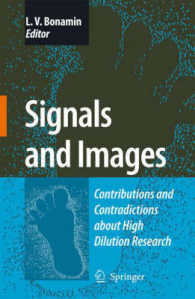- ホーム
- > 洋書
- > 英文書
- > Science / Mathematics
Full Description
Numerous new technologies and approaches have been developed since the first publication of Fundamentals of Environmental Engineering. This newly revised and updated edition continues to have a focus on fundamental concepts and on mass and energy material balances, but it eliminates some of the least-used concepts and allows space for new and more common aspects of environmental engineering practice. Expanding its use at the junior level, the author explains current environmental engineering issues including emerging contaminants and management of air, water, soil, and sediment pollution.
Features
Provides up-to-date information on a variety of emerging contaminants and new technologies for air and water pollution
Discusses some of the more common aspects of environmental engineering practice and eliminates some of the least used and difficult concepts
Explains the mathematics of mass and energy balances to guide environmental assessment in a way that doesn't follow traditional civil engineering-oriented introductory textbooks
Updated coverage for a one-semester course with new problems that emphasize practical field-orientated applications for environmental engineers
Undergraduate students in environmental, civil, energy, industrial, and chemical engineering will find that this textbook is an excellent overview of the fundamentals that environmental engineers should understand. Professionals involved with the environment such as regulators, researchers, academics, and practitioners concerned with the protection and management of the environment will also find this textbook to be an invaluable resource.
Contents
1. Introduction. 2. Environmental Hazards and Their Management. 3. Introduction to Environmental Engineering Calculations. 4. Physical and Chemical Equilibrium. 5. Rate Processes. 6. Air Pollution and Its Control. 7. Water Pollution and Its Control. 8. Soil and Sediment Pollution and Its Control.








